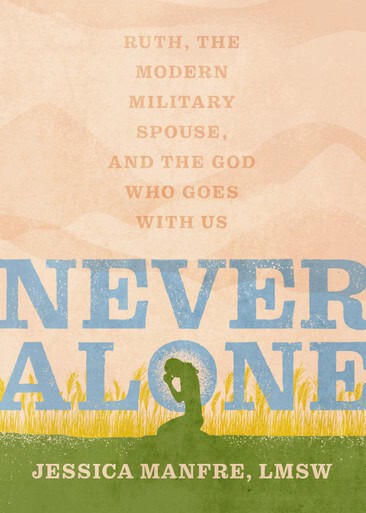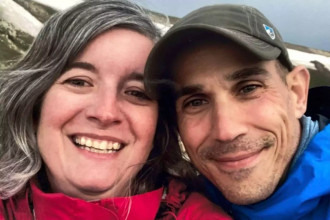Preview:
Jessica Manfre: But, you know, it was very hard, it was very hard having a small child, you know, walking that path, um, and you do it without family. And, you know, you’re on your own. You have to build your own family wherever you are.
End of Preview
John Fuller: Well, today on Focus on the Family with Jim Daly, we’ll explore some of the unique challenges and difficulties of military families. And, Jim, to get us started, we have a quotes that have been given to us that honor the sacrifice and the service of military spouses, those who stay behind when their husband or wife is deployed. Uh, for example, here’s one: “It takes a strong person to be a solider. It takes a stronger person to love a solider.”
Jim Daly: That’s good. That’s a good one. Here’s another one: “Home is where the military sends us, and love is what keeps us together.”
John: Hm.
Jim: How about that?
John: I like that one a lot. Um, here’s one, it’s gonna tug at the emotions a bit I think: “You’re my favorite hello and my hardest goodbye.”
Jim: Boy, that, that gets you, right?
John: Mm.
Jim: Yeah.
John: Yeah.
Jim: You feel that one. How about this: “Waiting is a sign of true love and patience. Anyone can say I love you, but not everyone can wait and prove it’s true.”
John: Ah.
Jim: Those are good ones.
John: Mm.
Jim: And, uh, today we’re gonna talk with a special guest, Jessica Manfre, who is married to a member of the United States Coast Guard.
John: Mm-hmm.
Jim: And I’m looking forward to the conversation.
John: Yeah. There’s a lot here, and, um, the research is very clear, uh, these families relocate 10 times more often than others.
Jim: Yeah. Wow.
John: Uh, moving on average every two to three years. Uh, there’s so much stress associated with that, and Jessica is a licensed social worker, and author, and mother of two children. And her husband Scott, uh, serves, as you said, Jim, with the US Coast Guard. Jessica has a little book that is full of insights and, uh, encouragement. It’s called Never Alone: Ruth, the Modern Military Spouse, and the God Who Goes With Us. Learn more about our guest in this great resource when you stop by focusonthefamily.com/broadcast.
Jim: Jessica, welcome to Focus on the Family.
Jessica: Thank you for having me.
Jim: This is your first time.
Jessica: It is.
Jim: So we’re looking forward to this. This is an area of content that we try to build up, uh, because we hear from a lot of military families-
Jessica: Mm-hmm.
Jim: … around the world that are deployed, and, you know, they’re struggling with different issues just like the rest of us, right?
Jessica: Mm-hmm.
Jim: Although, I think that environment, if you haven’t served, you really don’t know it. You can imagine it, but the deployments and other things like that, um, we’re gonna get into that kind of discussion about being away from the family for a long period of time. But first, let’s talk about you and Scott’s, uh, romance, how’d you meet, fall in love, and how’d you say yes?
John: Mm.
Jessica: It’s embarrassing. Are you sure you want this story?
Jim: Yeah-
John: (laughs)
Jim: … oh, this is the best part.
John: Oh, yeah.
Jessica: Oh, gosh.
Jim: I didn’t know it was embarrassing-
Jessica: It’s definitely embarrassing.
Jim: … but this is good.
Jessica: So, you know, I grew up in Florida, Bradenton, small town, and there’s definitely a Coast Guard station there.
Jim: (laughs)
Jessica: And so, you know, um, I was going to school and waitressing and, um, befriended, you know, he and some of his friends. And then about six months into it, we went on a date. And I said, “What do you do?” And he said, “I’m in the Coast Guard.” And I said, “What’s that?” I don’t know why-
Jim: (laughs)
Jessica: … he wanted to date me after that ’cause that’s embarrassing. It’s-
Jim: Not really. I mean, not everybody knows about the Coast Guard. You don’t know what their duties and responsibilities are.
Jessica: Yeah.
Jim: But they’re a branch of the military, right?
Jessica: Yep. Absolutely. And-
Jim: Protecting the coast-
Jessica: Yeah.
Jim: … protecting waterways and-
Jessica: I, I think I made up for it, you know?
Jim: … other… Yeah.
Jessica: I was going to school and I took maritime history.
John: Oh.
Jim: Just to enlarge your-
Jessica: Just… Yes.
Jim: … understanding.
John: Huh.
Jessica: Yes. I, I already had-
Jim: Well then, you’re committed.
Jessica: I had my history credits, but I was like, “I’m gonna take this all the way.”
Jim: This was before you were married though, right?
Jessica: This was before we were married. And, I mean-
Jim: Wow. That’s why he married you.
John: (laughs)
Jim: Yeah.
Jessica: I fought with the professor who said they weren’t a branch of the military, and I said, “Excuse me. (laughs)
John: (laughs)
Jessica: Actually…”
Jim: You can’t really listen to the professors.
Jessica: No, no. Um-
Jim: What do they know?
Jessica: What do they know?
Jim: Just kidding.
Jessica: Yeah.
Jim: Well, let’s, uh, let’s get into the picture about the loneliness that you’ve experienced as a military wife. You’re speaking… I don’t know if you combine all the military, uh, Coast Guard, et cetera, how many married couples are in there, but millions.
Jessica: Mm-hmm.
Jim: And when you look at deployments and those things, uh, w- what does it look like for you as a military wife?
Jessica: Yeah. So, you know, the Coast Guard, uh, is challenging. Um, a lot of people don’t realize that they are pretty much on mission all the time. My husband was on Cutter’s patrol boats. And, you know, while I have friends that, you know, their spouses would go off for a year, nine months, mine would be gone for two and a half months, home for eight weeks, gone for two and a half. So it was very much whiplash, you know?
Jim: Yeah.
Jessica: And very challenging. And-
Jim: You, you’d, like, settle into a routine, then boom.
Jessica: Yes.
Jim: The change would happen.
Jessica: And then he would ruin it all. I mean, not really, but-
Jim: He would ruin it all. We’re gonna call him later. No, I’m kidding.
Jessica: Yeah, yeah, yeah.
Jim: I’m kidding.
Jessica: Um, but, you know, it was very hard. It was very hard having a small child, you know, walking that path. Um, and you do it without family. And, you know-
Jim: Yeah.
Jessica: … you’re on your own. You have to build your own family wherever you are.
Jim: Now, the uniqueness, although it’s, you know… Many, many people deal with issues, uh, of their family of origin. You had issues. Your dad was an alcoholic.
Jessica: Mm-hmm.
Jim: It kind of set you up for not a good result being married to a man who had to leave the home.
John: Hm.
Jim: Speak to the nature of that, what growing up was like, the hole-
Jessica: Mm-hmm.
Jim: … in your heart, just, uh-
Jessica: Yeah.
Jim: … tell us what was happening.
Jessica: Absolutely. You know, it was difficult. And, you know, I… Being a therapist now, I understand why I went through what I went through, the mistakes I made in my early years because it’s so vital that you have your parents in your life. And so for me, it was like I knew my father was choosing alcohol over me.
Jim: Yeah.
Jessica: You know, that was more important. And he wasn’t… I mean, I didn’t speak to him for over 10 years. He just disappeared.
Jim: Hm.
Jessica: And then when he did come back, it wasn’t pleasant. And so that is, that is very difficult. And then, you know, add in having, um, you know, a stepfather with his own issues, it didn’t set me up for success, right?
Jim: Yeah.
Jessica: I shouldn’t be where I am. When you talk about the statistics of, you know, adverse childhood experiences and such, there’s only 10 things on that list, and I had, like, six.
Jim: Hm.
Jessica: So the higher your score, the more apt you are to enter into high-risk behaviors, you know, suffer from anxiety, depression, and things. So I shouldn’t be here, but I had my family. I had my grandmother, my aunts. I was raised, you know, by an uncle who stepped in when my father left, a Vietnam War veteran, and he was-
Jim: Solid person.
Jessica: And then he died when I was 13 unexpectedly.
Jim: Hm.
Jessica: Then I had my grandfather, then he died when I was 17.
Jim: Hm.
Jessica: So it was just a lot of loss.
Jim: Right?
Jessica: But all that bad for me, pain becomes redemption when I can use it.
Jim: Where did the Lord show up for you? I mean, He’s always present. Where did you show up for the Lord is probably the better question (laughs).
Jessica: You know, I always describe my faith, and it’s really thanks to my grandmother, as, like, that pilot light, right-
Jim: Mm-hmm.
Jessica: … in a gas f-… It’s just there, right? But I was, like, going through the motions. I wasn’t really, you know, diving deep. It wasn’t until I went through some really hard things, and I truly felt Him coming, you know, working through my life that I was like, “Oh, that’s what this is,” you know?
Jim: Yeah.
Jessica: And it really came through the death of my grandmother.
John: Hm.
Jim: Yeah.
Jessica: That, that kind of, you know, overtook and just changed my view.
Jim: What, what age were you when it really sunk in and you, you thought, “Okay, now I get it”? How old were you then?
Jessica: I mean, I would s-… Having my children really changed me.
Jim: Yeah.
Jessica: You know, my son, you know, wanting-
Jim: So you’re married?
Jessica: Yeah.
Jim: That was the key. That’s where I was trying-
Jessica: Yeah.
Jim: … to go is-
Jessica: Yeah, I mean, I was going to church, I was-
Jim: … you, you and Scott were already married.
Jessica: But it was just… It was different. It didn’t… Uh, it wasn’t, like, an anchor-
Jim: Yeah.
Jessica: … you know, until I had my children and I was a little bit older.
Jim: And you guys met when you were how old?
Jessica: 19.
Jim: Yeah. So early, and then you married by 20-
Jessica: I was married at 22.
Jim: 22, so you dated for-
Jessica: Mm-hmm.
Jim: … quite a bit.
Jessica: Yeah.
Jim: And, uh, probably thought you had your act together. You knew where you were going, what’s gonna happen.
Jessica: I tried.
Jim: And… Well, no. But I mean, I that’s part of it, right?
Jessica: Yeah, mm-hmm.
Jim: And so you get married and you think, “Okay, I can do this.”
Jessica: Yeah.
Jim: And then all that stuff bubbles up.
Jessica: Oh, yeah.
Jim: So speak to that feeling, like, when you and Scott were first married and he’s going, “Okay babe, give me a kiss. I got to leave for two and a half months”.
John: Hm.
Jessica: Oh, yeah. Let’s talk about getting engaged, and then next day, we were married.
Jim: Okay.
Jessica: ‘Cause he got orders to Alaska, and their coast-
Jim: That kind of hastened it alone.
Jessica: Yeah. So we… I’m showing off my ring, I’m so excited. And then I get to work and he calls me. And he’s like, “I, I just got our orders. If we’re not married within 10 days, like, you can’t come.” The Coast Guard wasn’t gonna pay for me-
Jim: Right.
Jessica: … and I mean, he was, you know, a lowly five at the time. There was no affording me moving with him.
Jim: Right.
Jessica: And so we were married the next day. I was engaged for all of 12 hours.
Jim: Wow.
Jessica: Yeah. That was my introduction to military life.
Jim: But again, you knew each other for years.
Jessica: Oh, yes, absolutely.
Jim: So, no. I don’t want to make it sound-
Jessica: No.
Jim: … flippant, but-
Jessica: No, it wasn’t.
Jim: Yeah.
Jessica: But we had to grow up together. And the thing, you know, that I will speak on is a lot of military couples get married very young. A lot of, you know, enlisted specifically are going off and joining an enlisting because they’re trying to get away from something. So-
Jim: Huh.
Jessica: … we had to grow up together.
John: Hm.
Jim: Yeah.
John: As those moments, Jessica, press in and, and there are difficulties and loneliness, um, from what I understand in the book, you’re a fan of the movie Dumbo.
Jim: (laughs)
John: And I’m assuming it’s the-
Jim: Somehow, you’re gonna tie this together.
John: I’m assuming it’s the classic one, but there’s a lot in there that you use-
Jessica: Mm-hmm.
John: … and, uh, you suggest that this can help couples when there’s distance and separation and loneliness.
Jessica: Mm-hmm.
John: What, what is that?
Jessica: Um, what brings you down will eventually bring you up, up, up. And so it’s just-
Jim: (laughs)
John: Hm.
Jessica: I love it because, you know, this can really… This quote can be placed on any part of your life. There’s no escaping pain. God is not going to keep you from feeling pain-
John: Mm-hmm.
Jessica: … from going through hard times, but you know what, the sun does rise. Things do get better, but you have to be in it together. And when I talk about, like, marriages specifically, even our… If I’m working with couples that aren’t in the military, communication is such a big thing.
John: Yeah.
Jessica: You know, having a strong, you know, ability to communicate, whether if someone’s deployed or right in your home and you’re going through the roommate situation ’cause you’ve drifted-
John: Hm.
Jessica: … you know, just you have to come back together.
Jim: And Romans 8:18, which reminds us that our present sufferings are nothing compared to God’s glory-
Jessica: Mm-hmm.
Jim: … is kind of the biblical reference to Dumbo, I guess (laughs).
Jessica: Yes, yes. It’s even better, isn’t it?
John: It is, yeah.
Jim: Yeah, that’s true. It’s better. Uh, you believe having a covenant marriage is critical. I love that there have been, you know, a number of states including Louisiana that comes to mind where covenant marriage has been passed. Um, it’s different because it makes it more difficult to divorce-
Jessica: Mm-hmm.
Jim: … which is the whole purpose of a covenant marriage.
Jessica: Mm-hmm.
Jim: I with all 50 states had this-
John: Mm-hmm.
Jim: … in place, but some states don’t see the value of it. But describe covenant marriage, what the expectation is, and why you think, yeah, even if your, your state doesn’t recognize-
Jessica: Mm-hmm.
Jim: … covenant marriage, you as a Christian couple should enter into a covenant marriage.
Jessica: It’s just a deep promise. It’s just abiding. I mean, I… I mean, and I talk about this. There are certain situations. You know, I deal with this certainly as a therapist with physical abuse and things where, you know, we know, like, the safety of the person getting out. But if that… Absent of that, there really isn’t anything you can’t work through.
Jim: Right.
Jessica: Like, I truly believe that. And I have couples all the time that come to me and say, “Can our marriage be saved?” And I’m like, “If you’re both in it, if you’re both, you know, putting forth the work,” and it is work.
Jim: Right.
Jessica: You know, there are things that I don’t necessarily like about my husband. I love him. I love who he is today, and I love who he was, you know, when I met him when he was 22. But there were seasons in there where I was like, “Hm.” You know, they were rocky.
John: Hm.
Jim: Well, and that’s why we invited you in. We want to know more about Scott’s problems. (laughs)
Jessica: Yeah, there we go.
John: (laughs)
Jim: I’m just kidding. (laughs)
Jessica: Let’s go.
Jim: I’m just kidding, yeah.
Jessica: (laughs)
Jim: I mean, that’s… We all bring-
John: Yeah.
Jim: … stuff in. And, you know-
Jessica: Oh, he brought stuff in.
Jim: Oh, sure.
Jessica: I mean, his, his father, you know, divorced multiple times.
Jim: Yup.
Jessica: Mother, same thing.
Jim: Hm.
Jessica: You know, had a stepfather that was a police officer, and unfortunately very verbally abusive. And so he had his own hangups-
Jim: Yeah, of course.
Jessica: … that he had to get through. And that’s why I say we had to grow up together-
Jim: Yeah.
Jessica: … ’cause…
Jim: When you look at military couples, you know, some of the things, if you haven’t been in the military-
Jessica: Mm-hmm.
Jim: … it’s only what you can imagine, but we’ve had guests on. I’m thinking of, uh, Chad Robichaux-
John: Oh, yeah.
Jim: … and he referred to his deep darkness of PTSD where he almost took his own life.
Jessica: Mm-hmm.
Jim: Uh, describe especially that situation with PTSD, ’cause people, if you don’t experience it-
Jessica: Mm-hmm.
Jim: … you’d probably say, “Well, just pick yourself up and get going.” Uh, it’s not that easy.
Jessica: It is not. It’s debilitating, and, you know, people don’t realize that around 60% of Americans have experienced PTSD at some point in their lifetime. It can happen from a car accident, witnessing a traumatic event, um, constantly being exposed to trauma like our military are when they’re deployed, you know? So that constant, you know, feeling of, like, hypervigilance-
Jim: Mm-hmm.
Jessica: … paranoia, being unable to sleep and quiet the mind. You know, you go without sleep for a while. Imag-… I mean, how do you feel if you, if you don’t sleep well, you know?
Jim: Yeah.
Jessica: But imagine living that for months on end.
Jim: Yeah.
Jessica: You know, so it’s very debilitating and hard. You can-
Jim: Well-
Jessica: … you can struggle well, though.
Jim: Yeah. And all those engagements, when you’re engaging somebody. I mean, my boys and I talk about that.
Jessica: Mm-hmm.
Jim: And they’re in their 20s, so it’s something that, you know, kind of captures the imagination of young men about being in that experience, you know, where you’re-
Jessica: Mm-hmm.
Jim: … hand-to-hand, and you’re trying to-
Jessica: Mm-hmm.
Jim: … take care of business. Um, it’s part of what is expected of you, even for the Coast Guard, interdiction with drug smugglers-
Jessica: Mm-hmm.
Jim: … and-
Jessica: Absolutely.
Jim: … you know, you’re jumping on ships that people have guns-
Jessica: Oh, yeah.
Jim: … and they’re firing back at you. Uh, that’s not what most of us experience in life.
Jessica: Right.
Jim: And so that’s what we’re talking about. When you… When they get home from that experience-
Jessica: Yes.
Jim: … they have to become husband and dad and-
Jessica: Mm-hmm.
Jim: … you know, not really let those things affect him. How have you found ways to cope with that with your husband?
Jessica: Well, we, we’ve had deep discussions about this. Um, the military is very orderly. Imagine that. You know, organized-
John: Mm-hmm.
Jessica: … likes things just so, right, boot camp. We’re not your recruits, Scott.
Jim: (laughs)
John: (laughs)
Jessica: We’re your family. Like, we’re not perfect. Things are gonna be sticky and messy. You have two children. Like, this is life. But I can meet you where you are ’cause I tend to be more, like, “Hm.” I mean, I like neat, but I, I don’t-
Jim: We’ll get to it later.
Jessica: Right. Uh, I would rather, you know, play with my kids than worry about the dishes whereas he’s like, “We do the dishes, and then we play.” So we have to meet in the middle. So I think we balance each other, but when you’re young and you’re unaware, those little things, those irritations, they could turn into big things. And it’s usually because you’re not communicating, right?
Jim: Well-
Jessica: You’re storing it up.
Jim: Yeah, and I would think that in that context, you feel, and I don’t think he would intend this, but I know as a husband, Jean would say to me, “I feel like you’re devaluing me right now.”
Jessica: Mm-hmm. Exactly.
Jim: Uh, and that’s not… Neither side is really saying that.
Jessica: No. Not at all. He is, uh-
Jim: Uh, but we can interpret it that way, and that is what-
Jessica: Completely.
Jim: … upsets us.
John: Mm-hmm.
Jessica: Absolutely.
Jim: Yeah.
John: Yeah. I-
Jessica: And love language is important.
Jim: Yeah.
Jessica: His is acts of service. Imagine that.
Jim: Yeah (laughs).
John: (laughs)
Jessica: Mine is words of affirmation. He’s not-
Jim: Imagine that.
Jessica: He, he’s not-
John: He’s not around.
Jessica: … a huge talker.
Jim: Yeah.
Jessica: So we’ve had to have those, you know-
Jim: Yeah.
Jessica: … where I’m more aware, he’s more aware.
Jim: Yeah, it’s good.
Jessica: We’re not perfect.
John: Yeah.
Jessica: We’re not robots.
Jim: That’s the work you’re talking about-
Jessica: Mm-hmm.
Jim: … putting in for your marriage.
Jessica: Yup.
John: Yeah. And this is Focus on the Family with Jim Daly, and our guest is Jessica Manfre. Today, we’re talking about the unique challenges military families face. And we want to recommend her great book to you, Never Alone: Ruth, the Modern Military Spouse and the God Who Goes With Us. It’s a terrific book, and we have that here at Focus on the Family. We also have a free online marriage assessment. It’s a simple tool designed to help you and your spouse get on the same page and understanding in terms of goals and priorities. It addresses communication. Uh, it reflects where you’re doing well and maybe offers some insights into ways you can grow. All of this in our free online assessment. And, uh, you can also find out about the book at our website focusonthefamily.com/broadcast.
Jim: Jessica, uh, another aspect that you write about is the difficulty military families have developing friendships-
John: Mm-hmm.
Jessica: Mm-hmm.
Jim: … deep friendships ’cause you’re on the move so much. You’re redeployed every couple of years, and-
Jessica: Mm-hmm.
Jim: … you know, just makes it really hard to have deep community. So what do you do to, to, you know, create that community even though it may not be there?
Jessica: Oh, that’s a hard one. Um, and I had to learn this lesson. You know, our first move, you know, to Alaska, uh, we were supposed to be there for three years. And I made some beautiful friends. And unfortunately, we were there for 14 months because the admiral that he was working for asked him to follow to Virginia.
John: Hm.
Jessica: So that was the most heartbreaking, you know, experience of my life. But it taught me a lesson. You know, your closest friends, the people you love the most are not necessarily gonna be right next to you, and so you have to use, you know, what you can, be intentional with your time. So it was a good lesson. As far as making friends, you know, I think we’re kind of lucky. Uh, we have a commonality immediately when we get to a base.
Jim: Yeah.
Jessica: There’s gonna be another military spouse. You’re gonna find one with kids. Typically, there’s spouses groups where we can kind of, you know, weedle our way in and find things to do, and, you know, kind of get to know each other pretty quickly. My closest friends, the friends that I would lay down my life for live nowhere near me.
Jim: Right.
Jessica: Yeah.
Jim: Everybody’s redeployed somewhere else.
Jessica: Yeah. Some are in Texas, some are in New York, and I’ve got some in Arkansas. Like, everybody’s all over.
Jim: You know, Jessica, some of the most tender programs that we do are with couples, uh, or women who have had a miscarriage.
Jessica: Mm-hmm.
Jim: You, you also, uh, had a miscarriage, and you wrote about that in the isolation that you felt because Scott was not available. He was deployed.
John: Hm.
Jessica: Yup.
Jim: And, and you’re going through this on a base, I’m assuming, where you didn’t have a lot of connection. So what did you do to cope with those emotions of loss and grief in isolation?
Jessica: Yeah. No, it was probably one of the hardest things I’ve ever walked through because, you know, I so-
Jim: Mm-hmm.
Jessica: … deeply wanted that baby, you know? And going through it in the hospital alone without anybody around, like, I wouldn’t wish that on anybody. But for me, I always say, you know, in those moments, God sent me a nurse to tell me, “Me, too,” to give me a hug, to give me what I needed to be able to walk out the door. And then I had friends rally around me, you know, as I navigated it. And it wasn’t easy. Everyone I knew was pregnant, um-
John: Hm.
Jessica: … or we would have friends over, and they would announce their pregnancy. And I was just, like, gutted, but it’s like I have to be happy for them. This is a new life. Like, this is a beautiful thing.
Jim: Right.
Jessica: Um, you know, I probably bought too many clothes on Amazon, that was not a healthy coping strategy.
Jim: Right.
Jessica: But really, it was my friends.
Jim: These have been all great insights, but let’s get to the theme of the book, Ruth. And I never thought about Ruth in a military spouse context, but describe why that kind of smacked you in the heart to say, “Wow, Ruth is kind of like me”.
John: Hm.
Jessica: Yeah. No, that’s a good one. So I… It’s no secret I love reading. I love books. I obsess with books, and I think I really always loved Ruth because it’s so narrative. You know, you can feel yourself there walking through it. And I, I looked at Naomi specifically with the losses that she had, you know, her husband, then her children. It’s like, “What do I have left? I have nothing left to give God,” you know, being in that space of bitterness. And sometimes, we don’t want to acknowledge that all of us can feel that and be there. And then you’ve got a pagan moment that comes in and says, “No. Like, where you go, I go.” And that’s where it came to me. Th- uh… You can put it in friendships, you can put it in, you know, the relationship between a spouse and the service member following them, you know-
Jim: Yeah.
Jessica: … this journey.
John: Hm.
Jim: And e- in all of those things, like with Ruth and Naomi, and even with what you experience in covenant marriage, tying a bow around all that, it sounds like the criticality of faithfulness in that environment-
John: Hm.
Jim: … is really important.
Jessica: Mm-hmm. Yeah, it really is. And it’s… Uh… She… Nobody could have imagined that story being… How, how would Naomi come back to faith? You would think, “Oh, she’d be surrounded by her friends, her family. Maybe she would have found it on her own.” I think she… I, I don’t know that she would have survived without, you know, Ruth when I think about just the way that they, everything happened.
Jim: Hm.
Jessica: Um, because how do we pull ourselves out, you know, finding that faith in God and knowing that He’s there and that we’re not alone. Sometimes we need reminders.
Jim: Hm.
Jessica: And in this case, it came from her, from Ruth.
John: I really appreciate that, Jessica. And that, as you’re speaking, I’m thinking, um, as a family gets redeployed as there are moves, and this applies, I think, to any family that moves, when we get to a new place, there can be an overwhelming sense of loneliness. But what I hear you saying is, among other things, some practical advice for those families that are moving is look for a place where you can plug in and give-
Jessica: Mm-hmm.
John: … not just plug in and be ministered to, but look for ways to give. Is that a good summation?
Jessica: Absolutely. And for me, you know, kindness and serving, that’s, you know, one of the first things I always recommend. Because listen, we all want to know where the best hairdresser is or the schools for our kids.
Jim: (laughs)
Jessica: Like, those are… I get it. Or the doctors. But, like, where can you really, you know, put those roots in? And for me, especially if you’re feeling down, anxious, depressed, lonely, there is something beautiful about giving back to others and the feeling that we get, you know, and the hormones that go through our body and kind of light us up. It doesn’t fix our problems-
John: But what’s the starting point for that?
Jessica: It’s a starting point. For me, it’s, “Okay, where…” I, I have heart for those who are homeless. It’s, you know-
John: Hm.
Jessica: … something that, um, is near and dear to me. So it’s like, “Let me find the nearest shelter.” I’ll look into, “Okay, does this area have a domestic violence family center,” you know, and find a way to go in there. It, it doesn’t have to be about money. It’s about your time, you know, what you can do, um, and then you meet people.
John: Hm.
Jessica: You, you’re meeting people that also want to serve-
John: Yeah.
Jessica: … you know? So that’s just another way to get plugged in. And it’s not necessarily always military. Uh, that’s a great way to connect and bridge that divide with civilians, too.
John: Hm.
Jim: It sounds like that environment, it kind of pulls you, hopefully, toward Christian ethics, which is rather good, right?
Jessica: Absolutely.
Jim: I mean, it gives you the time, your husband’s deployed or your spouse is deployed, and-
Jessica: Mm-hmm.
Jim: … kids are in school, so then what can I do to give back to the community? I think, you know, we should all, as Christians-
John: Mm-hmm.
Jim: … be looking at those opportunities kind of regardless of what stage of life we’re in.
Jessica: Mm-hmm.
Jim: Um, you got involved with Giving Tuesday Military. Describe what that is, the mission of it.
Jessica: It’s a crazy idea is what it was.
Jim: Yeah.
John: (laughs)
Jim: (laughs)
Jessica: You know-
Jim: We love crazy ideas. They’re usually from God.
Jessica: Yeah.
John: Hm.
Jim: (laughs)
Jessica: It really was. You know, uh, we, we really just wanted to look for a way to unite. Uh, when I think of the military, really we could be missionaries, right? We’re all over the globe.
Jim: Right.
Jessica: So we have an opportunity to see a need wherever we are on this earth and meet it. And so really, that’s what it was. It was just a rallying call for our service members’ families to go into the community and serve on that day. And it was so powerful, um, and special that we just, we didn’t want it to be one day. And so that’s where the Inspire Up Foundation came to be. You know, we want to inspire up the next wave.
Jim: Yeah. Let me ask you this question. It’s kind of the reverse of that. With churches all over the country, especially where there’s military bases, I’m, you know, no matter where you live, you typically will live near a military base. In California where I grew up, there’s plenty. Pendleton, and, uh, you know, there’s air bases around here in Colorado Springs. We have Peterson, we have Fort Carson, we have NORAD.
Jessica: Mm-hmm.
Jim: I mean, there’s a lot of military.
John: Mm-hmm.
Jim: Space Command is here.
Jessica: Mm-hmm.
Jim: So I mean, there’s a lot of action here. What would you say for the churches? You know, we look as Christians-
John: Mm-hmm.
Jim: … and as church community, we’ll look at, at churches that will have outreach. Our church does a big outreach to, uh, homeless moms and their kids. And that’s awesome. But what about military? What can churches think about, pastors think about when it comes to ministering to the military community?
Jessica: This may come off harsh, and I don’t mean it to be, but it’s direct. And I, I’ve experienced this myself because I’ve moved nine times. Treat us more than just someone sitting in a seat. And I say that because, because we’re so, you know, we’re nomadic the way we move constantly. Sometimes, you know, I’ve been in churches where they didn’t necessarily want to allow me to get super involved because they knew I was gonna leave, or they didn’t really want to get to know my family ’cause they were trying to protect their hearts ’cause they knew, you know, we were gonna leave. And so for me when I’m speaking to churches, it’s really welcome us.
John: Hm.
Jessica: Like, help us feel like we belong even if it’s just for those two years or three years. Make those count, you know? So I would say, “See us.”
Jim: Yeah.
John: Yeah, it seems like it’s almost, uh, double down. This is a short assignment, so let’s not, uh, play around. Let’s go all in to help this family.
Jessica: Oh, yeah. And we will go all in, you know?
John: Hm.
Jessica: We, we, we set up our hou-… Listen, my husband and I, our house is set up within 24 to 48 hours. We’re not playing around. We need to have that, and then we want to, you know, do all the things.
John: Mm-hmm.
Jessica: So, yeah.
Jim: It’s good. A final kind of question related to married couples in the military, I mean, the, that spouse that’s hearing this going, “That’s me, that’s what I’ve lived, this-
John: Hm.
Jim: … loneliness, this isolation, and I’ve always taken it out on my spouse,” what can they do to kind of reset-
John: Hm.
Jim: … themselves? One, get the book (laughs).
Jessica: Mm-hmm.
Jim: We’ll get it to you. Just contact us, and John’ll have details of that in a minute, but-
John: Mm-hmm.
Jim: … w- what’s a word of wisdom for the person who’s seeing themselves in your spot years ago struggling?
Jessica: Mm-hmm. Yeah. Um, I mean, number one is have faith. Number two, you know, ask for help, because if you look at the statistics, you know, military spouses have higher rates of depression, anxiety, binge-drinking because we cope the things that aren’t healthy, which is why I always say, “Where can you serve? Find a way to get plugged in.”
Jim: Mm-hmm.
Jessica: Um, because if you’re surrounded by positivity and support, the chances are you’re not gonna feel that loneliness. Loneliness is deep, you know? It’s a lack of community, a lack of feeling like you belong. And so that’s where the church, the local church can really rally around, you know, these spouses. And, uh, it’s very interesting. This book came out, and two months prior, the surgeon general said loneliness was an epidemic because of what all of us faced during-
Jim: Right.
Jessica: … the pandemic. And so this isn’t an isolated thing that we only feel. You know, I think that there’s a lot of people out there who are lonely.
John: Hm.
Jessica: So-
Jim: In fact, just to give that information, you talked about that loneliness index being how high now?
Jessica: Very high. And it’s… The thing is, is when you are that lonely and feeling that, it’s worse than smoking, it’s worse than… Those feelings will impact your physical health, you know?
John: Hm.
Jessica: It can cause heart disease. I mean, there’s just so many things that are intertwined with it. It’s not just, “I’m lonely.” You know, and I talk about that. Like, there’s a difference between solitude. For me, it’s going in the woods, you know, listening to great music and just really resetting. That’s solitude. Holding up in your house and slowly retreating further and further into a shell, that’s, you know, it’s not healthy. And it will manifest in some pretty ugly ways unfortunately.
Jim: Right.
Jessica: You’ll take it out on your spouse, your kids. If you’re not happy, if you’re not well, then you can’t be well for anyone else.
John: Hm.
Jim: No, that’s so good. And Jessica, you packed this little book with so much information. You did a great job-
Jessica: Thank you.
Jim: … hitting the issues, and appreciate your background not just as a therapist, but, you know, living it and going through it and being able to kind of unpack that biblically and therapeutically about what, uh, couples need to be looking for. So get in touch with us, and, uh, you know, if you can make a gift of any amount, we’ll send you a copy of Jessica’s book as our way of saying thank you for being part of the ministry. If you can’t afford it, get in touch with us. We’re here for you. We’re a Christian ministry, and we’re gonna trust others will take care of the cost of this.
John: Yeah, our donor team makes it possible for us to produce, uh, shows like this and to have caring Christian counselors available when a family is struggling. Uh, if you don’t know where to turn, give us a call. Just know that our donors make it possible for that team to take that call and to speak with you. It’s a free consultation, and, uh, they’ll guide you through whatever you’re going through. So, uh, donate as you can, request this book, Never Alone by Jessica Manfre, and, uh, know that you’re helping others thrive in Christ. And don’t forget about that free online marriage assessment, as well. Our number is 800, the letter A and the word FAMILY, 800-232-6459. And all the details are at focusonthefamily.com/broadcast.
Jim: Jessica, thanks for being with us.
Jessica: Thank you for having me.
Jim: Really appreciate it. Yeah.
Jessica: I appreciate it.
Jim: It’s been good.
Jessica: This was wonderful.
Jim: Mm-hmm.
John: And coming up next time, Dr. Kevin Leman will help you discover why your child might be misbehaving.
Preview:
Dr. Kevin Leman: But you need to understand that message that the kids are feeling like they need more parent, they need more love, they need more acceptance. And that’s the art of being a parent is making that kid feel special.
End of Preview





















